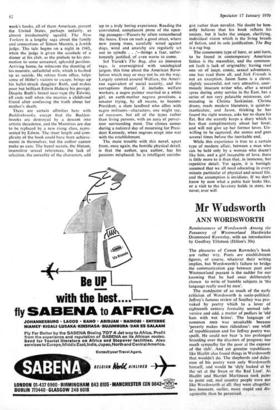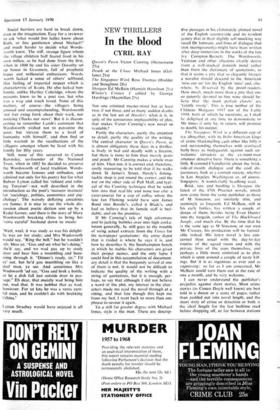Mr Wudsworth
ANN WORDSWORTH
Reminiscences of Wordsworth Among the Peasantry of Westmorland Hardwicke Drummond Rawnsley, with an introduction by Geoffrey Tillotson (Dillon's 30s) The pleasures of Canon Rawnsley's book are rather wry. Poets are establishment figures, of course, whatever their writing implies, but Wordsworth's failure to bridge the communication gap between poet and Westmorland peasant is the sadder for our knowing that he had once deliberately chosen to write of humble subjects in 'the language really used by men'.
The standpoint of so much of the early criticism of Wordsworth is socio-political. Jeffrey's famous review of Southey was pro- voked by poetry which to a lover of eighteenth century formality seemed sub- versive and odd, a matter of pedlars in 'old hats with wet brims'. The language of common men was unsuitable because 'poverty makes men ridiculous': one whiff of republicanism and for Jeffrey poetry was spoilt. He could not bear 'a too prolonged brooding over the disasters of progress; too much sympathy for the poor at the expense of the rich'. And yet genuine republicans like Hazlitt also found things in Wordsworth that wouldn't do. The shepherds and dales- men of his poetry were only Wordsworth himself, and would be 'slyly looked at by the set at the Swan or the Red Lion'. As Hazlitt and Harriet Martineau took pains to point out, real country people were not like Wordsworth at all: they were altogether less innocent, surlier, more stupid and dis- agreeable than he perceived. Social barriers are hard to break down, even in the imagination. Easy for a reviewer to ask 'what would fine ladies know about Ruth, or fine gentlemen about Michael?' and much harder to decide what Words- worth knew. The stiff, strange figure whom the village children half feared lived in his own milieu, as he had done from the first, when in 1800 he and his sister Dorothy set up house in Grasmere, full of prophetic
hopes and millennial enthusiasm. Words- worth lacked a sense of others' selfhood, that feeling of impartial respect which is characteristic of Keats. He also lacked bon- homie, unlike Hartley Coleridge, whom the peasants knew to be a poet too, but who was a wag and much loved. None of this matters, of course—the villagers being amused and uncomprehending, Wordsworth `not iver exing fowk aboot their wark, nor noticing t'flocks nor nowt'. But it is discon- certing to remember Lamb's comment that Wordsworth wished not to patronise the poor, but 'elevate them to a level of humanity with himself', and then find so little warmth in the recollections of the villagers amongst whom he lived with his family for fifty years.
Still, none of this occurred to Canon Rawnsley, co-founder of the National Trust, when in 1882 he decided to preserve the Wordsworth of local tradition. Words- worth became famous and orthodox, and admired not only for his poetry but for what Bulwer Lytton called his 'refined and refin- ing Toryism'—not well described in the introduction as the poet's `maturer instincts' for `sociology, politics, economics and psy- chology'. The naively deflating anecdotes are funny: it is nice to see the whole dis- cussion about poetic diction sent up by a Rydal farmer, and there is the story of Mary Wordsworth breaking china to bring her `verra careful' husband down to meals: 'Wed, weel, it was study as was his delight: he was aw for study; and Mrs Wudsworth would say, "Ring the bell," but he wouldn't stir, bless ye. "Goa and see what he's doing," she'd say, and we wad goa up to study door and hear him a mumbling and bum- ming through it. "Dinner's ready, sir," I'd ea' out, but he'd goa mumbling on like a deaf man, ya see. And sometimes Mrs Wudsworth 'ud say, "Goa and brek a bottle, or let a dish fall just outside door in pas- sage." Eh dear, that maistly wad bring him out, wad that. It was nobbut that as wad, howivver. For ye kna -he was a verra care- ful man, and he couldn't do with brekking t'china.'
Lytton Strachey would have enjoyed it all very much.



































 Previous page
Previous page